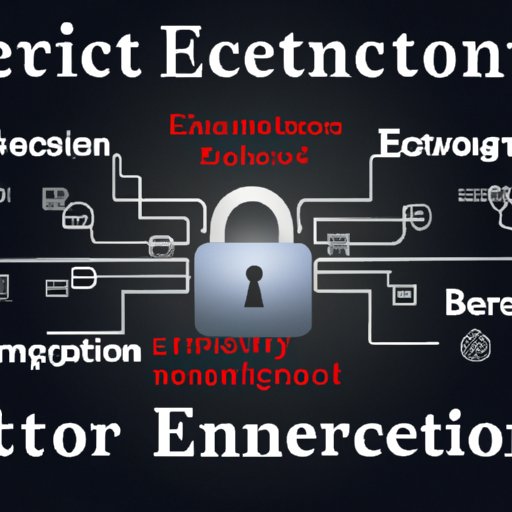
Overview of the Latest Advances in Encryption Technologies
Encryption technology is a form of data security that scrambles data so it can only be read by those with the correct key or password. It is becoming increasingly important as businesses and individuals rely more heavily on digital information to operate. In order to protect their data, they must understand the various encryption technologies available and how they work.
The latest advances in encryption technologies offer numerous benefits, including improved data protection and enhanced user experience. Different types of encryption technologies are available, such as symmetric, asymmetric and quantum computing. Each type has its own advantages and disadvantages, and understanding which is best suited to a particular situation is essential.

Exploring the Benefits of New Encryption Technologies
New encryption technologies provide a range of benefits, from increased data protection to improved cybersecurity. These technologies enable businesses and individuals to keep their data safe and secure, and they also help to enhance the user experience.
Increased data protection – Data encryption protects against unauthorized access to sensitive information, ensuring that only authorized users can access it. This helps to prevent data breaches and other malicious attacks, making it difficult for hackers to access confidential data.
Improved cybersecurity – By encrypting data, businesses and individuals can reduce the risk of cyber attacks. Encryption makes it harder for attackers to gain access to data, as they would need to obtain the correct key or password in order to decrypt it. This helps to protect against potential threats such as malware, phishing scams and ransomware.
Enhancing user experience – Encryption technologies can also improve the user experience by providing a secure and reliable connection for users. This ensures that users have access to the data they need without having to worry about potential threats.
Reviewing the Different Types of Encryption Technologies Available
There are several different types of encryption technologies available, each with its own advantages and disadvantages. Understanding the differences between them is essential in order to determine which is best suited to a particular situation.
Symmetric encryption – Symmetric encryption uses a single key to both encrypt and decrypt data. It is fast and efficient, but the key must be kept secure in order to ensure the data remains encrypted.
Asymmetric encryption – Asymmetric encryption uses two keys – a public key and a private key. The public key is used to encrypt data, while the private key is used to decrypt it. This provides an extra layer of security, as the keys are not stored together.
Quantum computing – Quantum computing is a relatively new technology that utilizes the properties of quantum mechanics to solve complex problems. It is being used in encryption technologies to increase security and speed up processing times.
Examining the Impact of Recent Encryption Technologies on Cybersecurity
Recent advances in encryption technologies are having a significant impact on cybersecurity. These technologies are improving authentication systems, enhancing data security and increasing resilience to cyber attacks.
Improved authentication systems – Encryption technologies are being used to create stronger authentication systems. This helps to ensure only authorized users can access data, reducing the risk of unauthorized access.
Enhanced data security – Encryption technologies also help to protect data from potential threats. By encrypting data, businesses and individuals can reduce the risk of cyber attacks and ensure that their data remains secure.
Increased resilience to cyber attacks – Encryption technologies are also helping to make systems more resilient to cyber attacks. By encrypting data, it becomes much harder for attackers to gain access to it, reducing the risk of potential threats.

Analysing How New Encryption Technologies Increase Data Protection
New encryption technologies are helping to increase data protection. These technologies are improving encryption algorithms, introducing end-to-end encryption and creating secure authentication protocols.
Improved encryption algorithms – Encryption algorithms are being improved to make them more secure and resistant to attack. This helps to ensure data remains encrypted even if an attacker gains access to the encryption key.
End-to-end encryption – End-to-end encryption is a type of encryption that encrypts data at both ends of the communication process. This ensures that data remains secure even if it is intercepted by an attacker.
Secure authentication protocols – Authentication protocols are being improved to ensure only authorized users can access data. This helps to prevent unauthorized access and reduce the risk of data breaches.
Exploring the Use of Quantum Computing in Encryption Technologies
Quantum computing is being used in encryption technologies to increase security and speed up processing times. This technology utilizes the properties of quantum mechanics to solve complex problems, and it is becoming increasingly popular in the field of encryption.
Overview of quantum computing – Quantum computing utilizes the properties of quantum mechanics to solve problems. It is faster and more powerful than traditional computing, and it is being used in a variety of fields, including cryptography.
How quantum computing is used in encryption technologies – Quantum computing is used in encryption technologies to increase security and speed up processing times. This technology enables businesses and individuals to encrypt data more securely and quickly, ensuring data remains secure and protected.
Benefits of using quantum computing in encryption technologies – Quantum computing offers numerous benefits for encryption technologies. This technology increases security and speeds up processing times, making it an ideal choice for businesses and individuals who need to protect their data.

Assessing the Challenges and Opportunities for Implementing Advanced Encryption Technologies
Implementing advanced encryption technologies can be challenging, but there are also numerous opportunities for increased efficiency. Cost, availability of skilled personnel and regulatory compliance are some of the issues that need to be taken into consideration.
Cost of implementing advanced encryption technologies – Advanced encryption technologies can be expensive to implement, as they require specialized hardware and software. Businesses and individuals should carefully consider the costs involved before investing in these technologies.
Availability of skilled personnel – It can be difficult to find skilled personnel to implement advanced encryption technologies. Businesses and individuals should ensure they have access to the right expertise before investing in these technologies.
Regulatory compliance challenges – Advanced encryption technologies may also pose compliance challenges. Businesses and individuals should ensure that they are compliant with all applicable regulations before investing in these technologies.
Opportunities for increased efficiency – Despite the challenges associated with implementing advanced encryption technologies, there are also numerous opportunities for increased efficiency. These technologies can help to reduce costs, improve security and enhance the user experience.
Conclusion
Encryption technologies are becoming increasingly important as businesses and individuals rely more heavily on digital information to operate. The latest advances in encryption technologies offer numerous benefits, including increased data protection and improved cybersecurity. Different types of encryption technologies are available, such as symmetric, asymmetric and quantum computing. These technologies are also having a significant impact on cybersecurity, improving authentication systems, enhancing data security and increasing resilience to cyber attacks. Finally, businesses and individuals should consider the challenges and opportunities associated with implementing advanced encryption technologies before investing in these technologies.
(Note: Is this article not meeting your expectations? Do you have knowledge or insights to share? Unlock new opportunities and expand your reach by joining our authors team. Click Registration to join us and share your expertise with our readers.)
